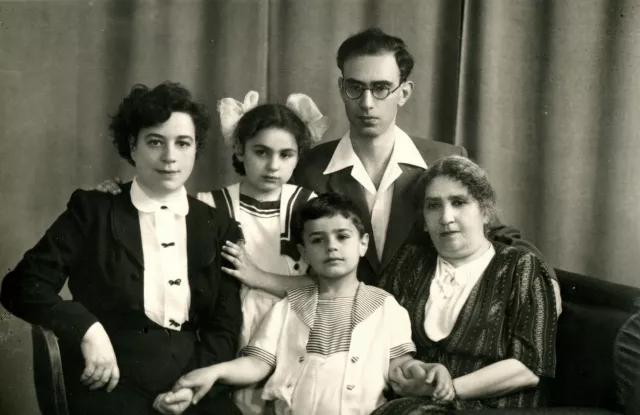Zhenia Kriss's family
Our family. From left to right: I, my daughter Irina, my son Alexandr, my husband Isaac Gragerov and his mother Raissa Gragerova. The photo was taken in Kiev in 1955 before Irina began school.
I returned to Kiev from my assigned workplace on Chiliken Island, Turkmenistan, in 1946. It was in ruins after the war, but how I longed to see my city! I began to look for work after I returned. My nationality - it was called Item 5 - was in my way wherever I went. When I went to inquire about a vacancy I was told there was one, but after I left my documents it turned out that there was no vacancy any more. Once I visited the chemical laboratory at the Arsenal Plant asking if there was a vacancy. I was refused.
When I left the egress checkpoint I saw Isaac Gragerov, a former fellow student who had been in love with me before the war. 'What are you doing here?' I asked him. 'Waiting for you,' he replied. He was a post-graduate student in Moscow and was working on his thesis. When he came from Moscow he found my parents, and they told him where I was. We hugged each other and went for a walk to the banks of the Dnepr River.
We got married a few months later. We had a civil ceremony and started moving my belongings to Isaac's parents, who had an apartment in a house within the area of the leather factory. We were detained by a drunk militiaman that thought we were thieves carrying somebody else's belongings. We had to spend some time at the militia office. They let us go after they clarified the situation, and when we returned home there were guests waiting for us to celebrate our wedding. That's how our family life began.
Isaac got a job at the Institute of Physical Chemistry at the Academy of Sciences. I managed to get the position of junior scientific employee at the Institute of Non-Organic Chemistry. After a few weeks the director of the institute called me and said that it was a mistake to employ me as junior scientific employee and that if I wanted to stay with them I had to accept the position of senior lab assistant. This was at the onset of anti-Semitic campaigns that became a state policy in 1948-49. [This was the so-called campaign against cosmopolitans.]
While working as senior lab assistant I prepared my thesis. But this took place at the height of anti-Semitism in 1952. My tutor Efim Grinein, a Jew, was fired. Nobody wished to even accept my thesis for review. I prepared another thesis and defended it in 1956. I had many publications and students who were working on their thesis. But whenever I addressed the director of the institute, asking him when I would be promoted to the position of junior scientific employee he got embarrassed telling me that the time would come.
Our daughter Irina was born in 1948, and our son Alexandr in 1953. Our children, followed into our footsteps. They wanted to become chemists. It was next to impossible for Jews to enter higher educational institutions at that time in Kiev and they went to study in Moscow. Irina graduated from the Faculty of Chemistry at Moscow University. She married her fellow student Yuri Malitin. Irina and Yuri live and work in Kiev. They have two children: Andrei, who graduated from the Faculty of Biology at Kiev University, and Alexandra, who studies in the 10th grade of the lyceum at the Kiev Polytechnic Institute.
Alexandr entered the Technical-Physical Institute in Moscow. He became a specialist in molecular genetics and defended his thesis. During perestroika in Ukraine in the 1990s, when financing of scientific research in Ukraine was reduced dramatically, Alexandr went to work in America. Now he works on the development of new medications and manages a big scientific department. I am proud that he is my successor: I also dedicated my work to the development of medications that people need so much. Alexandr worked in New York, Chicago and Washington, and lives in Seattle now. Alexandr's wife is an architect, and his daughter, Masha, studies in art school.












